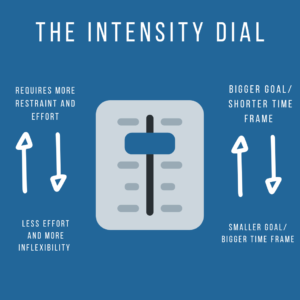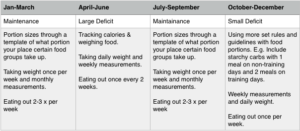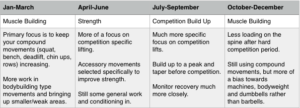Understanding The Effort Needed For Any Goal
You ever make one of those meals where you look at it once you’ve made it and think: I really don’t want to eat this?
I remember being deep into losing body fat after about 4 months of consistent effort at it. It was the first time I had made a conscious effort to try and get ‘abs lean’ with the help of my good friend and colleague at the time Robbie Thompson (go give him a follow!) and one of the things I distinctly remember was waking up one morning and blending up cauliflower and egg whites to make a pancake that I covered in zero calorie syrup.
Now, I want to clear up a few things. Firstly that this wasn’t on the advice of Robbie, he’s much better at providing food choices than this! And secondly, I had got to the point of just accepting my calories were that low that I would have to make some choices I didn’t consider normal. However, during this whole process I did still eat my favourite foods, just a lower quantity of them.
The whole process was a great reminder that the bigger the result you want to achieve, the more you will have to embrace restraint and be conscious of your choices. Granted, you definitely don’t have to blend egg whites and cauliflower. I would not recommend that.
The way I explain this nowadays is thinking of the magnitude of result you want to achieve in combination with the time frame as a thermostat. The bigger the goal and shorter the time frame, the higher your going to have to turn it up and the more you’re going to have to tolerate. If you have a big goal but a longer time frame, the dial doesn’t have to go as high but still high enough to be more to tolerate than you might be used to. If you don’t have a huge goal and a long time to get there, it’s likely not going to feel too different to normal.
My point here is this: a big part of pushing yourself outside of your comfort zone is knowing exactly how far out you are willing to go to and stay until you’ve achieved what you want.
I don’t think getting results has to feel like this all of the time at all. It would be a silly thing to try as it’s a level of restraint that is just simply unrealistic. But I do think it is worthwhile spending some time thinking about how you are going to organise that time around ‘easier’ periods of training/nutrition to make sure you don’t just burn out.
The first step for any change is getting ready for how your life is going to be when you make the changes you intend, how you will handle them and what you can do to keep you accountable to them when things inevitably gets harder.
One thing to be aware of whenever you are making change is that you may well want to resist it because it’s new. There is some degree of having to push through this. One tool I have found particularly useful for this is keeping a tick box chart of every time you manage to do this new habit/change. In essence, it’s that golden combination of knowing and doing.
To demonstrate what I mean by all of this here is a lovely little image I threw together with my long lost art skills….who’d have thought I aced my art A level. Turns out I’m not just a meathead after all 😉

Periodisation and organising your efforts
A word that you may have heard before is periodisation…essentially how you organise and prioritise what you are doing. It’s most commonly used in training talk, but it is completely appropriate across the board for goal setting, nutrition, mindset and training. The way I think of it is organising periods of hard effort around moderate and low effort, or doing things that you find more challenging to stick to for a set amount of time around things you can easily maintain.
It might look something like this if losing body fat is your goal (please remember this is a theoretical example and NOT what I would just recommend for everyone):

OR, if performance in strength sports is your goal, something like this:

What this allows you to do is know exactly what you need to be doing to achieve the outcome for each block and also to let blocks compliment each other. Hopefully you can see how periods of really hard, focused efforts are surrounded by things that aren’t as stressful for your body and mind. Dan John has a really good analogy for this, that there are traffic light times of your life. The green light (everything is lined up to push hard), amber light (can still push but not quite as hard as there are things going on elsewhere in your life) and red light (just maintain and let training and nutrition take the stress off instead of putting more stress on you).
Without meaning to sound harsh…too many people give up because things are difficult.
I’m not going to go on a rant here, but it is something that I think is worthwhile discussing. I’ve mentioned it before that I love the fact that there is a big push back against fad diets. But at the same time it’s almost gone too far in that pushing calories down low is seen as bad across the board.
Before we go any further, if you want to reassure yourself that your metabolism will not break if you go really hard with a large deficit…you can read my blog on it here.
I am all for making sure training, staying active and making sensible food choices for long term health are a focus for everyone. That’s really where the magic is for making things stick and keeping efforts sustainable over your lifetime. However, I also think it is worthwhile to go through at least one period of a hard push for something to learn about what that takes, how it feels and what you are really capable of.
I do think a lot of this comes down to mindset going in to something you will have to push hard for, be that in improving performance or working hard on your body composition. Having a plan and spending some time preparing both physically and mentally for it allows your efforts to flow a little more effortlessly into each block, rather than stumbling through and not really knowing what you’re really going for.
If you can take one thing from all of this, it’s looking at your goals like turning the intensity dial up or down
Remember, the bigger the goal and shorter the time frame…the more challenging it will be BUT also it may have a greater potential pay off. It all comes down to how willing you are and how realistic it is for you. There’s nothing wrong with going easier, sometimes that is exactly what you need. But when you can see the trade offs of time to result vs. effort put in you can better make and prepare for the choice.
